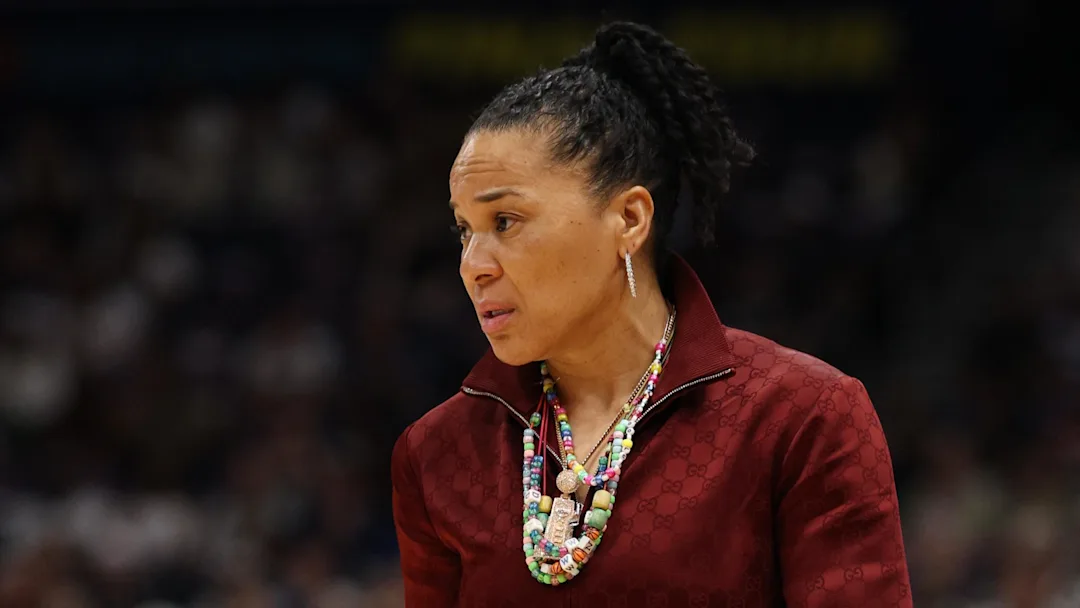Dawn Staley, the legendary head coach of the South Carolina Gamecocks women’s basketball team, is known not only for her competitive spirit and championship pedigree but also for her deep passion and connection to her team and program. Her journey has been marked by numerous triumphs, including multiple Final Four appearances and a national championship, yet amid these highs, some losses linger longer in her mind and heart than others. Recently, Staley opened up about a particular defeat that struck her as the toughest in her tenure at South Carolina—a loss to Iowa, led by the electric Caitlin Clark. This game, far from just a single result on the scoreboard, encapsulated so much more: the rise of a rival, the challenge of evolving competition, and the emotional weight that comes with leading a program at the highest level of collegiate basketball.
The game in question was not just any regular season or tournament contest; it was a clash between two elite programs, both vying for supremacy in women’s college basketball. Caitlin Clark, Iowa’s sensational guard, has become one of the sport’s brightest stars, known for her scoring prowess, court vision, and competitive fire. Facing a player of Clark’s caliber is always a test, but what made this loss particularly difficult for Staley was the broader context and what it represented for South Carolina’s quest to maintain its elite status.
From the outset, Staley emphasized that losing to Iowa and Caitlin Clark was a humbling experience. South Carolina, as defending national champions and perennial contenders, had set the bar incredibly high for themselves and their fans. Expectations were to compete and win consistently against top-tier opponents. The defeat, therefore, was not simply about the scoreboard but about confronting the reality of rising competition and the evolution of the game. It was a moment that reminded Staley of the relentless demands of elite sports, where every game can redefine narratives and shift momentum.
What made the loss to Caitlin Clark’s Iowa particularly challenging was the way Clark dominated the game. Her ability to score seemingly at will, create plays under pressure, and rally her team was on full display, putting South Carolina on the back foot. Staley, who has coached some of the greatest talents in women’s basketball history, acknowledged that Clark’s performance was a masterclass in individual excellence and leadership. Watching Clark navigate through South Carolina’s defense with such precision and confidence was a reminder of how one extraordinary player can impact a game in profound ways. This reality posed a new kind of challenge for Staley and her coaching staff: how to adapt defensive strategies to contain a transcendent talent while maintaining team cohesion.
Beyond the tactical considerations, the loss struck an emotional chord with Staley. She has always viewed herself as more than a coach; she is a mentor, a leader, and a guardian of the culture she has meticulously built at South Carolina. Losing to a rival team, especially in a high-profile matchup, felt like a personal and collective setback. The Gamecocks pride themselves on resilience, discipline, and a commitment to excellence, and this loss was a moment that tested those values. Staley reflected on how this defeat forced her and her team to confront vulnerabilities and reignite their competitive fire. It was a wake-up call to reassess, learn, and grow.
Another layer that added to the complexity of the loss was the intense media scrutiny and fan reaction that followed. When a team of South Carolina’s stature falls to an opponent like Iowa, especially led by a figure as compelling as Caitlin Clark, the narrative shifts quickly. Questions arise about the team’s identity, coaching decisions, and future prospects. Staley spoke candidly about managing this pressure—not just for herself but for her players who bear the brunt of public expectations. She highlighted the importance of focusing inward, maintaining trust in the process, and using external criticism as fuel rather than distraction. This mindset, she explained, is essential to navigating the highs and lows of a demanding season.
Importantly, Staley also discussed how this loss has shaped the team’s mindset moving forward. She views adversity as a critical component of championship journeys. The defeat to Iowa was painful, yes, but it also provided invaluable lessons. It emphasized the need for constant improvement, tactical flexibility, and mental toughness. Staley has instilled in her players the belief that setbacks are temporary and that the true measure of a team is how they respond. The Gamecocks’ subsequent practices, film sessions, and games have been marked by a renewed intensity and focus, driven by the collective desire to rebound stronger.
Staley’s reflections on the loss also underscored her respect for Caitlin Clark not just as a competitor but as an ambassador for the sport. While the defeat was tough, it was also a reminder of the beauty of competition and the emergence of new stars who elevate the entire game. Staley admired Clark’s skill, work ethic, and leadership, qualities she values deeply in her own players. This perspective reveals Staley’s larger view of basketball as a shared journey of excellence and growth, where rivalries push everyone to reach new heights.
The loss to Iowa and Caitlin Clark also highlighted the evolving landscape of women’s college basketball. The sport has seen a surge in talent, visibility, and competitiveness, with programs across the country rising to challenge traditional powerhouses. Staley acknowledged that the era of South Carolina dominating unchallenged is giving way to a more dynamic and unpredictable environment. This reality excites her, as it pushes her team to innovate and elevate their game continuously. She emphasized that adapting to this changing environment is crucial for sustained success.
In sharing why this loss was the toughest she has experienced at South Carolina, Staley also revealed her deep commitment to her players and program. She feels a profound responsibility not just to win games but to build a legacy of excellence, integrity, and character. Each loss is a moment to reflect on how to better serve her players’ growth on and off the court. This loss was no exception—it fueled her determination to lead her team with even greater purpose and vision.
Staley’s candidness about the emotional and strategic impact of the loss also offers a window into her leadership style. She is a coach who embraces vulnerability, transparency, and accountability. She does not shy away from tough conversations or difficult truths. Instead, she uses them as catalysts for growth. Her players respond to this authenticity, building a culture of trust and resilience that defines the Gamecocks.
Looking ahead, Staley is optimistic about South Carolina’s trajectory. She views the loss to Iowa as a chapter in a larger story—one that includes championships, growth, and relentless pursuit of excellence. The challenge posed by Caitlin Clark and Iowa has sharpened her team’s focus and resolve. It has reminded them that greatness is not given but earned, game by game, moment by moment.
In the competitive world of women’s college basketball, losses like this are inevitable, but they are also invaluable. They test character, inspire reflection, and ignite passion. For Dawn Staley and South Carolina, the loss to Caitlin Clark’s Iowa team was a defining moment—a moment of pain, yes, but also a moment rich with opportunity and promise. Staley’s willingness to share this experience so openly speaks to her strength as a leader and her unwavering dedication to her team’s success.
Ultimately, the toughest losses often become the most important lessons. For Dawn Staley, the loss to Caitlin Clark and Iowa was more than a game lost; it was a powerful reminder of the relentless pursuit required at the highest level of basketball, the respect owed to worthy opponents, and the unbreakable spirit needed to rise again. South Carolina, under Staley’s guidance, will undoubtedly carry these lessons forward as they strive for continued greatness.



